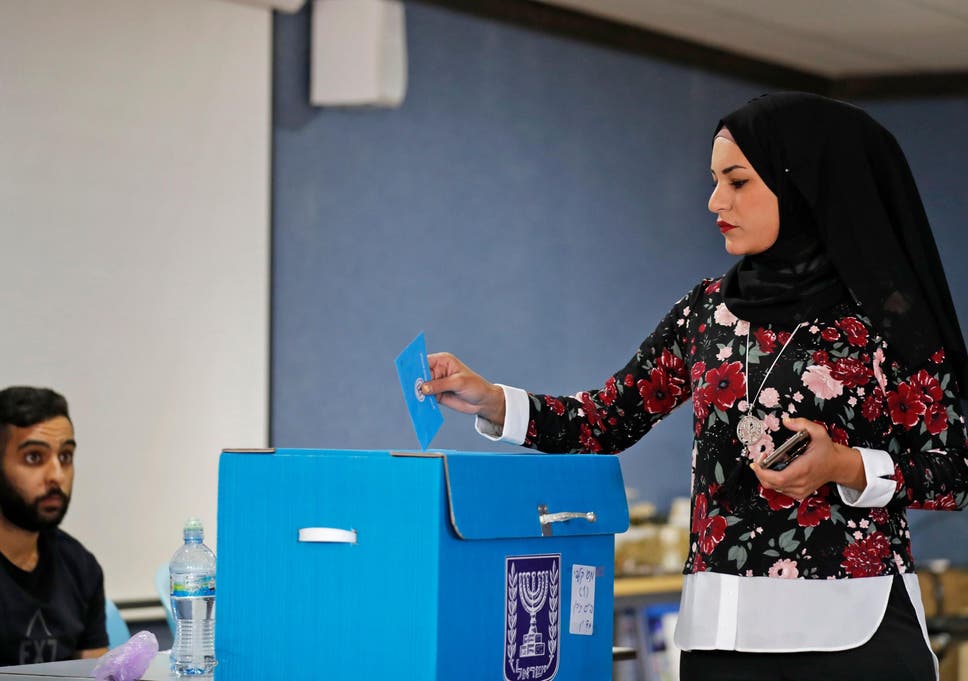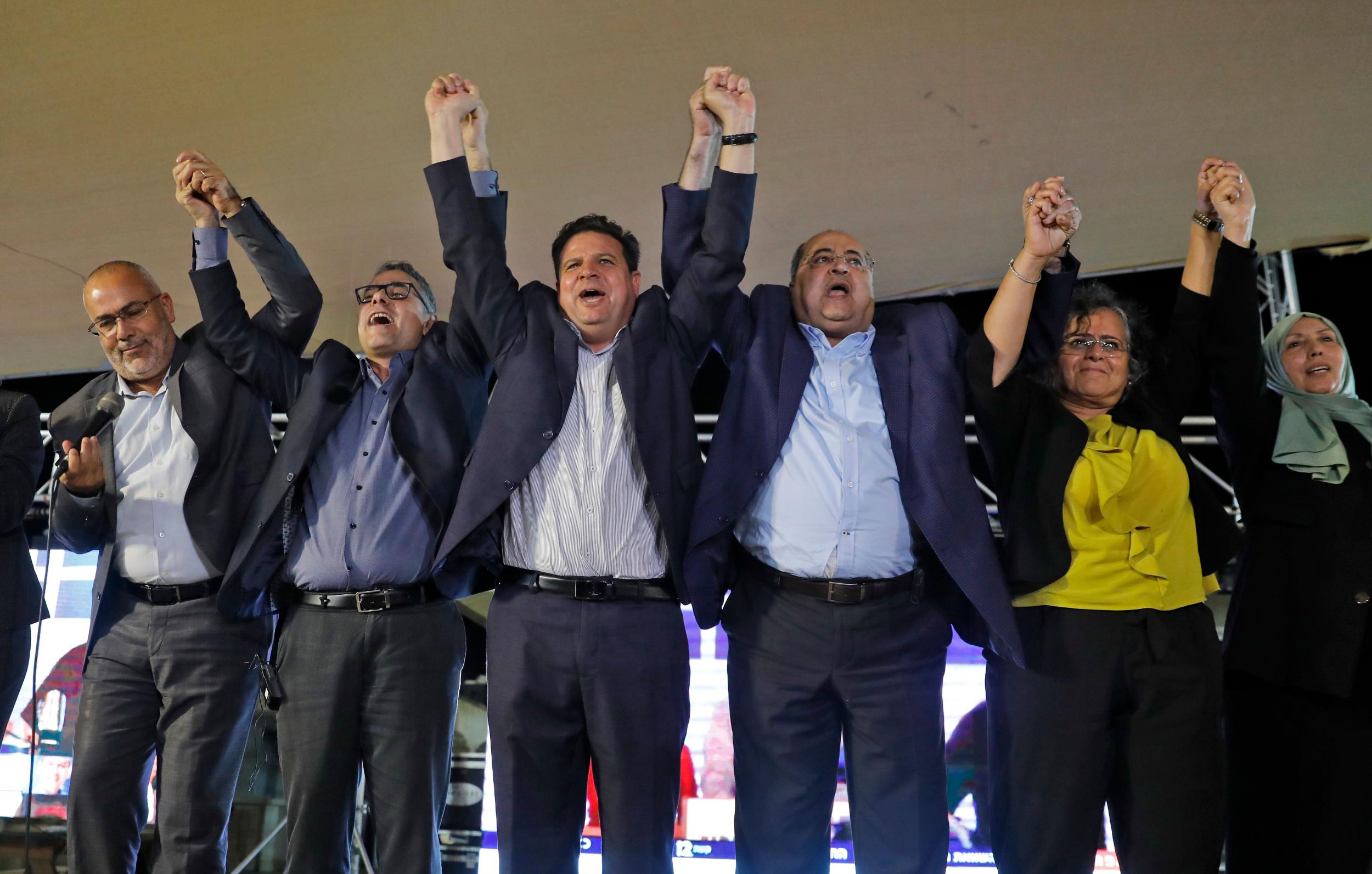
The results from Israel’s fraught second election offered no clear victory, leaving the country’s future hanging painfully In the balance.
But emerging from the ashes of the vote was one unlikely winner: Israel’s often marginalised Arab and Palestinian citizens.
As Benjamin Netanyahu and his archival Benny Gantz tousled over the make-up of a unity government, the vote count showed that the Arab Joint List was surfacing as the main opposition bloc and could even be the formal opposition for the first time in Israel’s history.
The coalition of Arab parties has long been vilified by Mr Netanyahu’s right-wing Likud party, who used the threat of a high “Arab turnout” during Tuesday’s vote to try to scare their supporters into heading the polling stations.
However, the partial results showed that tried and tested tactic may have “backfired this time”, Arab MKs told The Independent.
With more than 90 per cent of the votes counted, the Joint List is expected to win about a dozen seats in the 120-member assembly, coming third after Mr Gantz's centrist Blue and White and the Likud.
While this is a similar result to the 2015 elections, if Likud and Blue White form a unity government, widely pitted to be the only way to avoid a third election, the Joint List would be the next largest party, making them potential candidates for the formal opposition.
That would place them closer to the heart of power than ever before and would massively galvanise their ability to influence the national agenda.
“His tactics backfired, our community was so silent until Netanyahu provoked them,” Ahmad Tibi, a prominent MK on the Joint List told The Independent on Thursday.
“It seems that he was the best campaigner for our campaign,” he quipped.
Mr Netanyahu, a master orator and elections campaigner, launched a ferocious campaign to cling on to power, “throwing everything but the kitchen sink” at voters, one Israeli commentator said.
He and his supporters hoped to sweep enough seats to build an immunity government, one which might be able to shield him from the consequences of his likely indictment in three corruption cases.
Alongside promising to annex the entire occupied West Bank and nearly delaying the vote to launch a military offensive in Gaza, he also tried to garner more votes by coming down hard on the Arab minority, critics said.
Days before the election, Facebook even sanctioned his page for hate speech, after the page's chatbot began sending automatic popup messages saying, “We cannot have ... a secular left-wing weak government that relies on Arabs who want to annihilate us all.”
Mr Netanyahu said that he had not approved the message and it had been posted by a student volunteer for his campaign. He also vehemently denied any accusations that his campaign had been racist.
But he later posted a photo of the Palestinian flag projected over a Tel Aviv skyscraper warning his supporters if did not go out to vote, “this is how it will end”.
As voting was underway he ratcheted up the messaging in a slew of videos warning of high Arab turnout.
"[The media] says the percentage of voters is surprising. It's high among the Arab population. It's not surprising. The Palestinian Authority is coming out with an official statement and I quote, 'go out to vote and bring down Netanyahu’”, he said to a crowd at Jerusalem’s central bus station.
Yousef Jabareen, an Arab MK in the Joint List told The Independent that “incitement against Arabs reached another record low this election, it was intense.”
“Ironically it encouraged Arab voters to get more involved. The anger motivated the community to go out and try to vote for change” he added.
Ayman Odeh, the leader of the Joint List, which is a hodgepodge amalgamation of all the Arab parties, echoed the same point in an interview with the Associated Press.
“There is no other prime minister who incited against us like Netanyahu," he told the AP.
“There’s a limit. The Arab citizens undoubtedly felt that they became a persecuted minority, an endangered minority.”
He told reporters on Wednesday that higher Arab turnout was a critical factor in “preventing the establishment of an extremist right-wing government headed by Benjamin Netanyahu.”

Mr Gantz called Mr Odeh to congratulate him on his election gains. Israeli commentators pointed out this marked the first time a leader of Mr Gantz’s stature had made that kind of gesture to an Arab party.
Israel’s estimated 1.9 million Arab population makes up around 20 per cent of the country and is largely comprised of descendants of Palestinians who either stayed within their communities or were internally displaced after the 1948 war that surrounded the creation of Israel.
They officially enjoy full citizenship, including the right to vote, but lived under martial law until 1966 and still suffer widespread discrimination.
The Druze, a unique Arabic-speaking religious and ethnic group that practices an offshoot of Islam, however, traditionally serves in the army, often identifies as Israeli and is fiercely loyal to the state. Many within the Druze community even dispute the label of Arab.
The the Arab and Druze turnout soared from just 49 per cent in April to nearly 60 per cent this time around, according to a report by the Israel Democracy Institute, a think tank which analysed the partial results.
The IDI also said that the overwhelming majority of both groups, some 80 per cent, voted for the Joint List, while the next largest bloc, nearly 8 per cent, voted Blue and White.
Likud came second to last before the ultra-Orthodox parties, with just 1.3 per cent of the Arab overall vote.
Dr Tibi said that he hopes that the new position could help them deliver legislation to improve housing, education and law enforcement in often-ignored Arab communities and advocate for a two-state solution to the conflict with the Palestinians at a time when none of Israel’s main parties has made the peace process a priority.
The Arab parties’ increased influence could also allow them to block right-wing legislation like the Nation State bill narrowly passed last year, which defined Israel as nation-state of the Jewish people and removed Arabic as an official language.
Mr Jabareen agreed their new-found position as a significant opposition party would “bring our issues to the national and international arena”.
But he worried that a Blue and White led unity government would “become Likud version two”.
“I hope it will not only be a personnel change but a more substantial one," he said.







